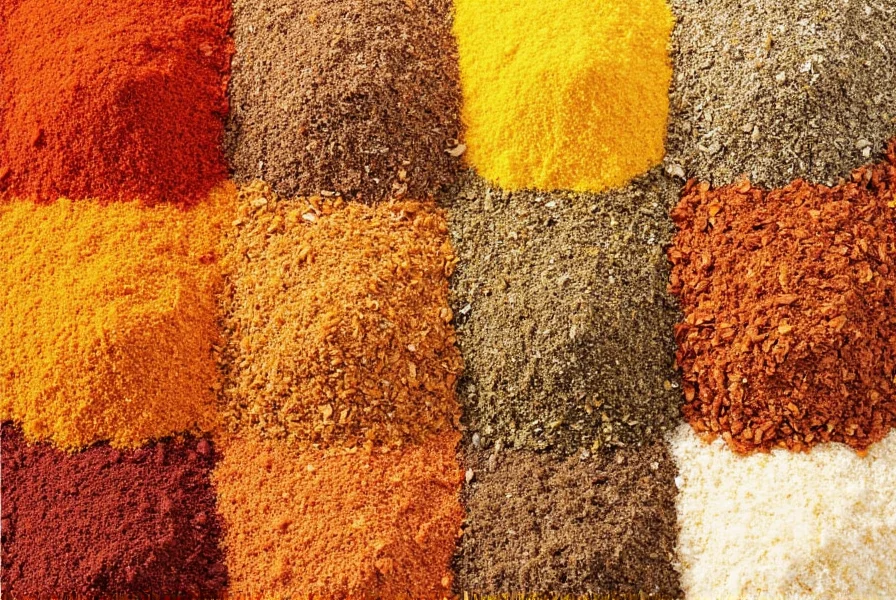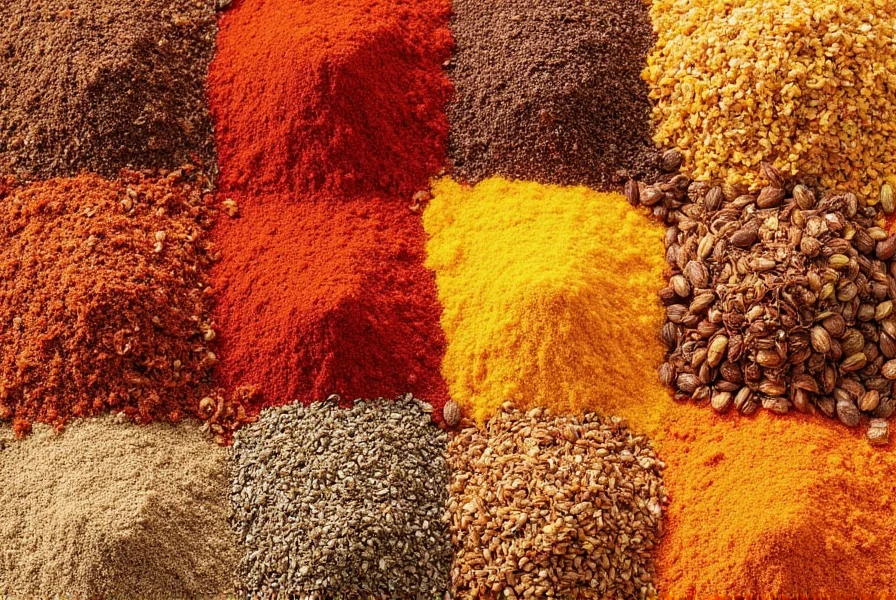Discover the top 10 African spices every home cook should know, including their origins, uses, and how to buy the best quality. These spices bring authentic flavors to your dishes while connecting you to Africa's rich culinary traditions.
Top 10 African Spices for Cooking
Berbere (Ethiopia)
A complex spice blend featuring chili, garlic, ginger, and fenugreek. Essential for Ethiopian Doro Wat (chicken stew) and lentil dishes. Use in slow-cooked stews for deep, warm flavor.
Ras el Hanout (North Africa)
"Top of the shop" Moroccan blend with up to 30 spices. Perfect for lamb tagines and couscous. Toast before adding to enhance its floral aroma.
Suya Seasoning (Nigeria)
Smoky, nutty blend used for Nigerian grilled meat skewers. Coat proteins generously before grilling for authentic street-food flavor.
Kaloum Spice Mix (Senegal)
Citrusy, herby blend essential for Yassa Chicken. Works great in marinades or dry rubs for chicken and fish dishes.
Piri Piri (Mozambique/Portugal)
Fiery chili sauce with garlic and citrus. Balance heat with lemon juice or honey when using on grilled chicken or seafood.
Dawadawa (West Africa)
Fermented locust bean paste that adds umami depth. Use like MSG in soups and stews for rich savory notes.
Mbuzi Mix (Tanzania)
Goat curry blend with cardamom, cloves, and cinnamon. Ideal for slow-cooked meat dishes and rice preparations.
Egusi Soup Seasoning (Nigeria)
Custom blend of ground melon seeds, crayfish, and dried shrimp powder. The foundation for traditional Nigerian egusi soup.
Peri Peri Rub (Southern Africa)
Earthier version of piri piri, perfect for grilled meats. Adds smoky depth without excessive heat.
Jollof Spice Blend (West Africa)
The secret behind legendary Jollof Rice. Each family has their unique version, but typically includes tomatoes, peppers, and aromatic spices.
| Spice | Best Use | Flavor Profile | Pro Tip |
|---|---|---|---|
| Berbere | Stews, lentils, soups | Spicy, warm, herbal | Add to slow-cooked dishes for deep flavor. |
| Ras el Hanout | Lamb, tagines, couscous | Fragrant, floral, sweet | Toast before adding to enhance aroma. |
| Suya Seasoning | Skewered meat, chicken, tofu | Smoky, nutty, slightly sweet | Coat meat generously before grilling. |
| Kaloum | Chicken, fish, rice dishes | Citrusy, herby, garlicky | Great with marinades or dry rubs. |
| Piri Piri | Grilled chicken, seafood, sauces | Fiery, tangy, citrusy | Balance heat with lemon juice or honey. |
Buying Guide: Choosing Authentic African Spices
1. Freshness Matters
Whole spices last longer than ground. For pre-ground blends, check expiration dates and look for vibrant color and strong aroma.
2. Trusted Sources
- African grocery stores in major cities
- Online specialty retailers focusing on African products
- Authentic brands like Noblesse Naturals (organic blends) or Mrs. Taste (affordable options)
3. DIY Spice Blends
Try making your own suya seasoning:
- 2 tbsp ground peanuts or peanut butter powder
- 1 tsp smoked paprika
- ½ tsp cayenne pepper
- ½ tsp salt
- ¼ tsp garlic powder
- ¼ tsp dried onion flakes
| Brand | Specialty | Pros | Cons |
|---|---|---|---|
| Noblesse Naturals | Berbere, Ras el Hanout | Organic, authentic blends | Higher price point |
| Mrs. Taste | Suya Seasoning, Egusi | Affordable, widely available | May contain preservatives |
| Spice Garden | Customizable blends | You build your own mix! | Shipping may be slow |
Frequently Asked Questions
What are the most common African spices used across the continent?
While Africa has diverse regional variations, berbere (Ethiopia), ras el hanout (North Africa), suya seasoning (Nigeria), dawadawa (West Africa), and piri piri (Mozambique) are widely used. Each region has signature blends defining local cuisines.
Are all African spices extremely spicy?
No. While piri piri is hot, many blends focus on complex flavors: berbere has herbal notes, ras el hanout is floral and sweet, and suya seasoning is smoky and nutty. African cuisine values flavor depth over just heat.
Where can I find authentic African spices outside Africa?
Look for African grocery stores, online specialty retailers (like Spice Garden), or mainstream stores carrying popular blends. For the most authentic experience, seek stores run by members of the African diaspora.
Start Cooking with African Spices Today
Begin by adding small amounts to familiar dishes. Try suya seasoning on grilled chicken or ras el hanout in place of curry powder. African spices transform ordinary meals into extraordinary culinary experiences.












 浙公网安备
33010002000092号
浙公网安备
33010002000092号 浙B2-20120091-4
浙B2-20120091-4